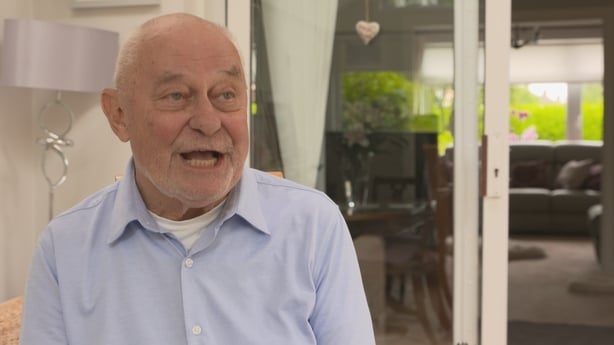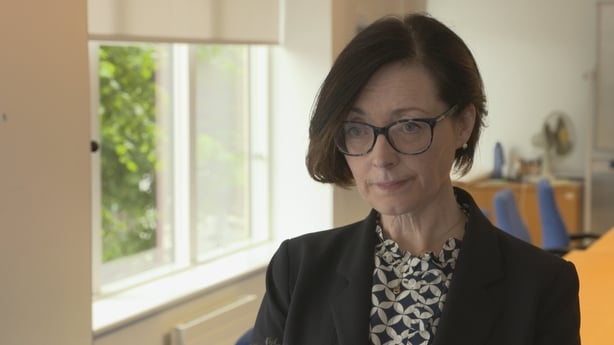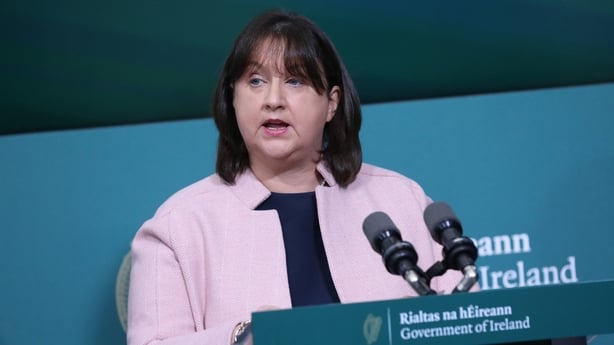Minister of State Anne Rabbitte has been forced to intervene in a disagreement between the Law Society and the Decision Support Service (DSS) over the structures put in place to establish Enduring Powers of Attorney under the new Assisted Decision-Making Capacity Act.
The DSS is for adults who may have difficulties with decision-making capacity, including adults with an intellectual disability, a mental illness, an acquired brain injury, or those with neurodegenerative conditions such as dementia.
The DSS process went live online over a year ago.
However, the Law Society has described the system as a cumbersome digital process which does not give solicitors signing legal practitioner statements sufficient insight.
'I gave up in despair'
At 79 years of age, Tom Maloney is technologically savvy.
He produced a quarterly magazine for an organisation when he retired, he banks online and regularly uploads receipts to his health insurance app.
Following a decision to update his Will, Mr Maloney was directed to the Decision Support Service website which had been up and running for almost a year.
He began the online application for Enduring Power of Attorney, which gives people authority to act on behalf of others.

It meant that Tom would give his wife Clare authority to act on his behalf, should he lose capacity to make certain decisions in the future, and Clare would do the same for Tom.
Their daughters were also listed as 'attorneys' on the document, but Tom had spelled one of their names wrong, so he looked for a means of editing the document.
"How do I edit it, couldn't find out, ring their helpline, a half an hour later I'm talking to one of their staff, a very nice guy but he didn't know anything about the computer system," he said.
Tom was told there was a 'button' on the top right-hand corner which said edit but he could not find it.
He was put on to another person who told him to delete the document and start again, which he did three times for his application and Clare's.
"At that stage I gave up in despair," he said.
"I'd say I've spent 14 hours on this in total so far," he added.
Law Society concerns
Tom is not the only person who has found the new system difficult to navigate, according to the Law Society, which represents solicitors in Ireland.
Recently, it raised several concerns including issues regarding the digital application process which the society said did not allow solicitors sufficient insight to sign the legal practitioner's statement.
If the system was working properly, according to Director General of the Law Society Mark Garrett, solicitors would not be required.
"It is driving members of the public to complain to solicitors, that it is not working for them," he said.
"This shouldn't need a solicitor, it should be straightforward enough, uncomplicated enough, you should be able to do this, do it online, do it through a paper-based system, whichever is your choice.
"If you feel you maybe want to use a professional service, you can then maybe come to a solicitor, but this should be available to as wide an audience as possible to every member of the public and simply that is not the system that has been put in place".
The Law Society aired its concerns publicly last week, which was not viewed lightly by the Decision Support Service.
The Law Society, according to the Decision Support Service, has a mandate to represent the interests of their members as it sees fit.
Service for 'ordinary people'
The focus of the DSS, according to CEO Áine Flynn, is to improve the service for the "ordinary person".
However, the Law Society has argued that the system promised is not people-focused because there are those in vulnerable situations who have been left with a level of uncertainty.

Over 70% of applicants (donors) have chosen not to instruct a solicitor to create and register their Enduring Power of Attorney for them according to the DSS which has also been keen to highlight the stories of people who, unlike Tom, are satisfied with the digital first service.
A couple in their 70s who said they were not "very computer literate", wrote to the DSS to say it was "superb" and thanked the case manager. Other testimonials included people ranging from their 20s to their 60s.
Ms Flynn also sought to clear up the notion that the DSS would not engage with legal practitioners.
"We're more than happy to engage with legal practitioners, we are doing so on an individual basis, and we have had extensive proactive engagement with the Law Society also," she said.
Both the Law Society and the Decision Support Service have been using statistics as proof in their individual arguments over whether the digital first system works or not, but statistics from either side were never going to solve the issue between both organisations.
In the end, Ms Rabbitte was drafted in to mediate.

More common ground required
Minister Rabbitte appealed for co-operation from both sides.
The Law Society told the minister that their members couldn't make representations or progress applications because everything was digitised.
The minister then spoke to the DSS.
A decision was made to expand the helpdesk at the DSS to support queries coming from the public, which currently stand at 80 to 100 calls per day.
"I thought had reached common ground on that, but I still understand that hasn't gone far enough for the Law Society," said Minister Rabbitte.
"I think it's important for me to say it's unfortunate, because that expanded helpdesk has to be tried and tested and stood up to its full capacity before we have an outcome on that."
Time will tell if a better resourced helpdesk will resolve issues for people like Tom, who is determined in the coming days to fill in the application form, for a fourth time, with support from the DSS.
Read more:
Almost 1,300 Decision Support Service applications made since launch
An independent network of practising solicitors in predominantly small and medium sized practices throughout Ireland established a petition earlier this month, calling on Minister Rabbitte to fix the system for the creation of an enduring power of attorney a matter of urgency.
Solicitors Growth Network said the people most in need of EPAs tend to be older and can be vulnerable and often do not have the computer literacy and digital skills to navigate an exclusively online system for a legal document.
1,409 people have signed the petition, which was delivered to minister this morning.







